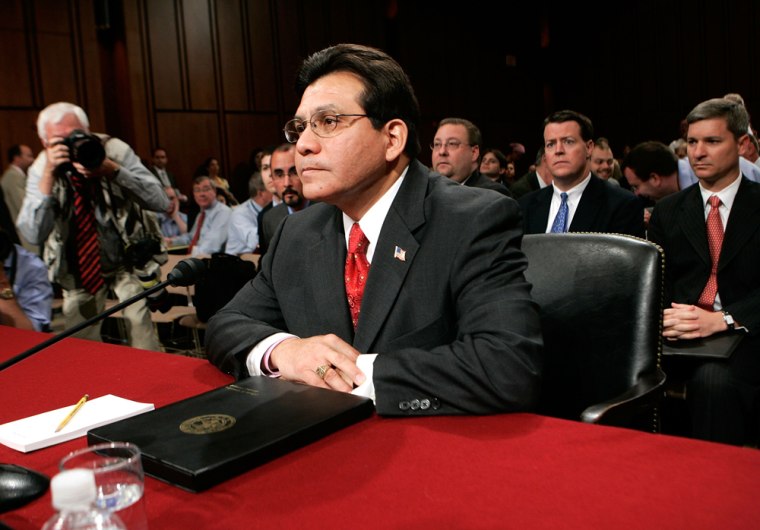Alberto Gonzales denied Tuesday that he and former White House chief of staff Andy Card tried during to pressure a hospitalized Attorney General John Ashcroft to recertify President Bush’s domestic eavesdropping program.
But lawmakers continued to press for answers from a recalcitrant White House, with one senior Republican raising the prospect of a special prosecutor to probe areas where Bush has blocked Congress.
“The constitutional authority and responsibility for congressional oversight is gone,” said Sen. Arlen Specter of Pennsylvania, the Judiciary Committee’s ranking Republican. “If that is to happen, the president can run the government as he chooses, answer no questions.”
Glaring at Gonzales just a few feet away at the witness table, Specter declared, “The attorney general has the authority to appoint a special prosecutor.” He added later that a special prosecutor would be one of several options to consider months from now, if the Senate cites Bush administration officials with contempt of Congress.
Democrats weren’t likely to stand in the way.
“I don’t trust you,” Chairman Patrick Leahy, D-Vt., told Gonzales, who succeeded Ashcroft as attorney general.
A sick Ashcroft
Gonzales’ credibility remained at issue throughout the proceedings, with senators of both parties growing exasperated and at some points accusing the attorney general of intentionally misleading the committee.
But the story about Gonzales’ famous 2004 hospital visit elicited the most anger from senators because it addressed the concerns of some that the attorney general’s loyalty to the president damaged his judgment and the Justice Department’s independence.
Gonzales said that he and Card had been urged by congressional leaders of both parties to take steps necessary to ensure that the unidentified intelligence program survive a looming deadline for its expiration. To do that, Gonzales said, he needed Ashcroft’s permission.
At the time, Ashcroft was in an intensive care unit recovering from gall bladder surgery and Gonzales was Bush’s White House legal counsel. Ashcroft had transferred the powers of his office to Deputy Attorney General James Comey.
“We went there because we thought it was important for him to know where the congressional leadership was on this,” Gonzales told the Senate Judiciary Committee in his first public explanation of the meeting.
“Clearly if he had been competent and understood the facts and had been inclined to do so, yes we would have asked him,” Gonzales added. “Andy Card and I didn’t press him. We said ’Thank you’ and we left.”
Conflicting version of events
Gonzales’ version conflicts with Comey’s.
“I was angry,” Comey testified in May, releasing details of the meeting for the first time. “I thought I had just witnessed an effort to take advantage of a very sick man who did not have the powers of the attorney general.”
Comey said that he and Ashcroft had decided against recertifying the classified program. There were concerns at the time about whether the domestic eavesdropping program violated civil liberties. The program was slated to expire on March 11, 2004, if not recertified by Justice.
But Gonzales said Tuesday that he did not know whether Ashcroft had made a decision or whether he had been aware of Comey’s objections. Furthermore, he said, House and Senate leaders of both parties urged him during an emergency meeting earlier on March 10 to make sure the program survived the deadline.
“How can you get approval from Ashcroft for anything when he’s under sedation and incapacitated? For anything?” Specter asked.
“We would not have sought nor did we intend to seek to get any approval from General Ashcroft if in fact he was not fully competent to make that decision,” Gonzales replied.
“I’m not making any progress here,” Specter snapped.
Intentionally misleading?
Sen. Charles Schumer, D-N.Y., grilled Gonzales on whether the attorney general provided misleading statements when he said there had been no dissenting views in the administration on the domestic surveillance program that then operated without warrants.
“How can you say you haven’t deceived the committee?” Schumer asked.
Gonzales stood by his comments.
“The disagreement that occurred, and the reason for the visit to the hospital, senator, was about other intelligence activities,” Gonzales said, refusing to say what the other program might be.
“How can you say you should stay on as attorney general when we go through exercises like this?” Schumer asked. “You want to be attorney general, you should be able to clarify it yourself.”
Sen. Sheldon Whitehouse, D-R.I., told Gonzales that he believes the attorney general intentionally misled the committee about which program caused dissent among administration officials.
Gonzales said he couldn’t say in an unclassified setting, but offered to go into more detail in private meetings with senators.
